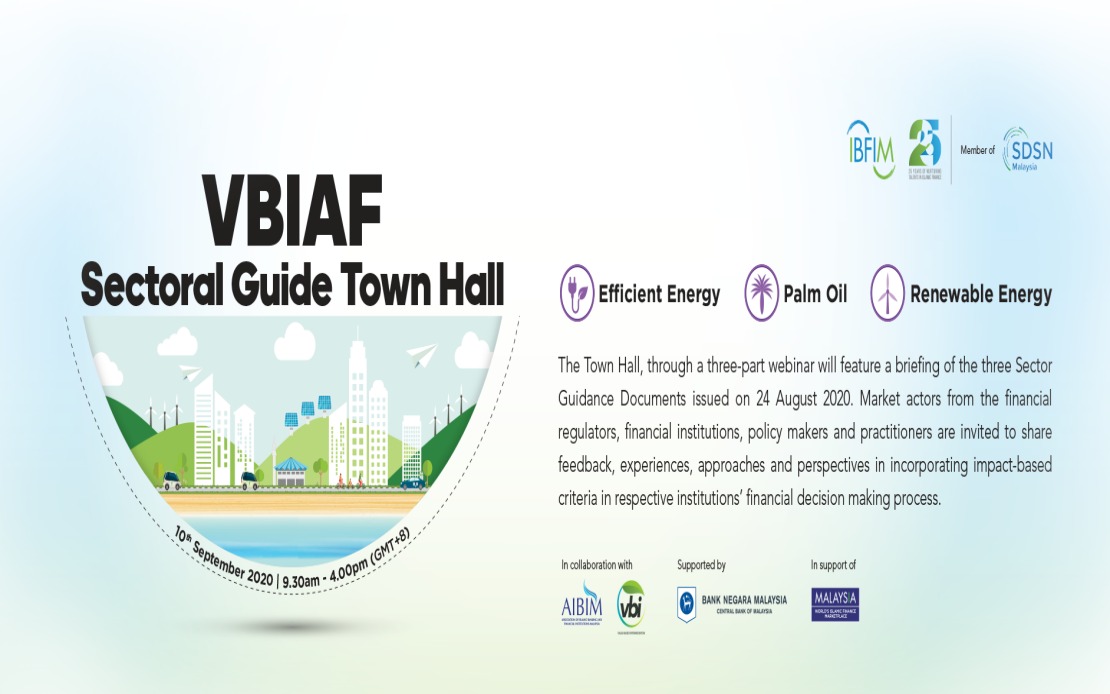News
Call for public feedback on VBIAF Sectoral Guides on Palm Oil, Renewable Energy, Energy Efficiency
KUALA LUMPUR, Aug 24 -- The Value-based Intermediation Financing and Investment Impact Assessment Framework (VBIAF) Sectoral Guide Working Group (Working Group) today issued the first cohort of the VBIAF Sectoral Guides on Palm Oil, Renewable Energy and Energy Efficiency.
The Working Group is spearheaded by the Value-based Intermediation (VBI) Community of Practitioners (CoP), which comprises 12 members of the Association of Islamic Banking and Financial Institutions Malaysia (AIBIM), said AIBIM in a statement here.
The banks are Agrobank, Alliance Islamic Bank Bhd, AmBank Islamic Bhd, Bank Islam Malaysia Bhd, Bank Muamalat Malaysia Bhd, CIMB Islamic Bank Bhd, HSBC Amanah Malaysia Bhd, Maybank Islamic Bhd, OCBC Al-Amin Bank Bhd, Public Islamic Bank Bhd, RHB Islamic Bank Bhd, and Standard Chartered Saadiq Bhd.
It said the VBIAF Sectoral Guides serve as an in-depth impact-based risk management toolkit to guide the financial institutions in implementing VBIAF on selected sectors at a more granular and transactional level and were jointly developed by members of the Working Group which consists of the CoP and relevant stakeholders.
They include Bank Negara Malaysia (BNM), Energy Commission (EC), Sustainable Energy Development Authority (SEDA), Malaysian Green Technology and Climate Change Centre (MGTC), Malaysian Palm Oil Council, Malaysian Palm Oil Certification Council, World Bank Group (Malaysia office), World Wide Fund for Nature (WWF), and Sime Darby Plantation Bhd.
This is a key step towards enhancing the readiness of the financial institutions in playing a catalytic role towards realising the government’s aspiration and commitment as a signatory to the 2015 Paris Agreement and to ensure sustainability of the entire palm oil supply chain and production as per Malaysian Sustainable Palm Oil (MSPO) standards, it said.
Collectively, these should pave the way for an orderly transition of the economy towards a low carbon nation. The VBIAF Sectoral Guides also support the climate-change initiative by BNM.
The VBIAF Sectoral Guides consist of the following components, namely definition and scope, commercial proposition, impact-based risk categories, risk metrics; and risk management.
The first cohort of the VBIAF Sectoral Guides is a continuation of several guidance documents issued by BNM in collaboration with the CoP, and complements the broad guidance provided in the “VBIAF -- Guidance Document” in the pursuit to incorporate environmental, social and governance (ESG) risk considerations in their financing and investment decision making process.
The Working Group invites responses and feedback on the VBIAF Sectoral Guides which will be conducted for a period of three-months starting Aug 24, 2020. The VBIAF Sectoral Guides can be viewed at https://aibim.com/VBI_VBIAF_Sectoral_Guide_Public_Consultation and all responses and feedback are to be submitted electronically by Nov 30, 2020 to vbi@bnm.gov.my.
-- BERNAMA
Other News
Sarawak Lepasi Sasaran Kapasiti Gabungan Tenaga Boleh Baharu Tahun Ini - Abang Johari

Oleh Nur Ashikin Abdul Aziz
SINGAPURA, 21 Okt (Bernama) -- Sarawak mencapai 62 peratus sasaran campuran kapasiti tenaga boleh baharu (TBB) tahun ini, melepasi sasaran 60 peratus yang digariskan dalam Strategi Pembangunan Pasca COVID-19 (PCDS) 2030.
Sarawak Pacu Pertumbuhan Tenaga Boleh Diperbaharui Untuk Manfaat ASEAN - Premier

SINGAPURA, 21 Okt (Bernama) -- Sarawak komited menyokong peralihan tenaga boleh diperbaharui di Asia Tenggara dengan memanfaatkan potensinya sebagai "Bateri ASEAN," yang akan membekalkan tenaga bersih menerusi sambungan Grid Kuasa Borneo dan ASEAN.
Belanjawan 2025 Percepat Peralihan Kepada Tenaga Bersih - Solarvest

KUALA LUMPUR, 19 Okt (Bernama) -- Belanjawan 2025 merupakan satu langkah ke arah mempercepat peralihan kepada tenaga bersih di Malaysia, kata Solarvest Holdings Bhd.
© 2025 BERNAMA. All Rights Reserved.
Disclaimer | Privacy Policy | Security Policy This material may not be published, broadcast,
rewritten or redistributed in any form except with the prior written permission of BERNAMA.
Contact us :
General [ +603-2693 9933, helpdesk@bernama.com ]
Product/Service Enquiries [ +603-2050 4466, digitalsales@bernama.com ]
